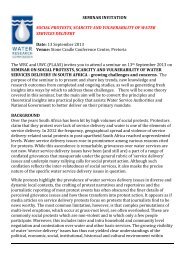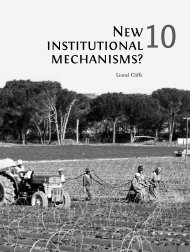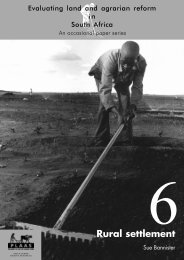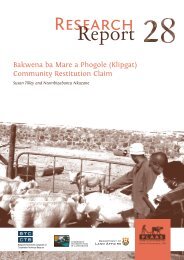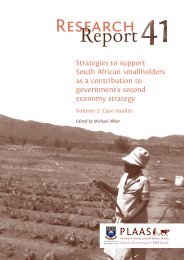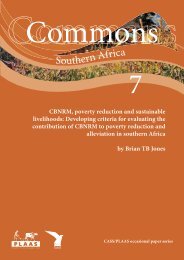A critical appraisal of South Africa's market-based land reform policy
A critical appraisal of South Africa's market-based land reform policy
A critical appraisal of South Africa's market-based land reform policy
Create successful ePaper yourself
Turn your PDF publications into a flip-book with our unique Google optimized e-Paper software.
Chapter 5: The LRAD programme<br />
The <strong>of</strong>ficials interviewed largely felt that<br />
it was too early to say whether the projects<br />
are sustainable or not, although they believe<br />
they could be, as long as the beneficiaries<br />
are dedicated. Some difficulties<br />
that they identify as negatively affecting<br />
sustainability are: conflicts within group<br />
projects; an over-dependency on DLA;<br />
some beneficiaries knowing nothing about<br />
farming; and others not being committed<br />
to farming.<br />
DLA had no information on the productivity<br />
on the farms or <strong>of</strong> the improvement<br />
in the lives <strong>of</strong> the beneficiaries. The <strong>of</strong>ficials<br />
interviewed seemed to believe that<br />
the LRAD projects had improved people’s<br />
lives, but did not have a sense <strong>of</strong> the extent<br />
<strong>of</strong> this improvement or any data to support<br />
their view. The main reason cited for a lack<br />
<strong>of</strong> information was the newness <strong>of</strong> the<br />
projects.<br />
The <strong>of</strong>ficials interviewed identified<br />
a number <strong>of</strong> key challenges for LRAD<br />
implementation, ranging from the size <strong>of</strong><br />
the grant and attitudes <strong>of</strong> beneficiaries to<br />
natural disasters such as droughts (see<br />
Box 1). They are responding to these<br />
challenges through providing training and<br />
technical assistance, encouraging beneficiaries<br />
to move from subsistence to<br />
commercial farming, and trying to access<br />
support from municipalities when there are<br />
natural disasters. According to a respondent,<br />
the Minister for Agriculture and Land<br />
Affairs is speaking to farmers’ unions in<br />
order to encourage them to release <strong>land</strong> for<br />
the LRAD programme (interview 3). Officials<br />
would also like to see more subdivision<br />
<strong>of</strong> <strong>land</strong>, but say there are policies<br />
blocking this.<br />
Government <strong>of</strong>ficials also had a number<br />
<strong>of</strong> recommendations for <strong>policy</strong> changes<br />
that they believe would improve the<br />
programme. They would like to see LRAD<br />
used in communal areas where people<br />
already have access to <strong>land</strong>, but do not<br />
have the resources to fully utilise the <strong>land</strong>.<br />
This is possible, according to the LRAD<br />
<strong>policy</strong> document (DLA 2001:10), but has<br />
not happened yet in Limpopo. Another<br />
suggestion made was to ensure that more<br />
<strong>of</strong> the beneficiaries are people with agricultural<br />
and management skills, including<br />
civil servants, so that they can share their<br />
skills. It was also suggested that the grant<br />
should be increased to keep pace with<br />
increasing <strong>land</strong> prices and to allow people<br />
to purchase larger farms in order to have a<br />
better chance <strong>of</strong> making a reasonable<br />
income. In particular the minimum grant <strong>of</strong><br />
Box 1: Challenges for LRAD<br />
Officials interviewed identified the following challenges for LRAD:<br />
1. The grant is not enough, given the price <strong>of</strong> <strong>land</strong> and the plans <strong>of</strong> the beneficiaries.<br />
2. Land owners are not willing to sell, or are demanding exorbitant prices.<br />
3. Most white farmers do not respect the government and do not support LRAD.<br />
4. Municipalities are not involved in assisting with projects.<br />
5. People do not know which department does what. Despite close relations between<br />
DLA and DoA, there is sometimes confusion, mostly arising from the high staff<br />
turnover.<br />
6. Beneficiaries lack skills.<br />
7. Natural disasters such as the drought are affecting the projects.<br />
8. People are not willing to move to where the commercial farms are.<br />
9. People who are involved in subsistence agriculture are not ready to be involved in<br />
commercial ventures and are not willing to take advice.<br />
27




